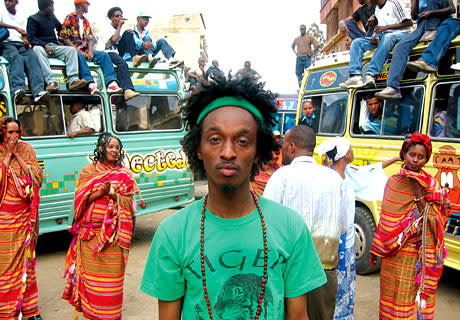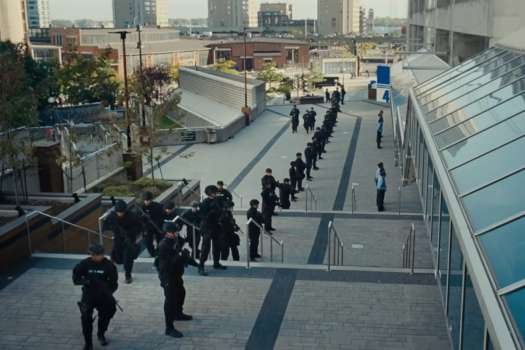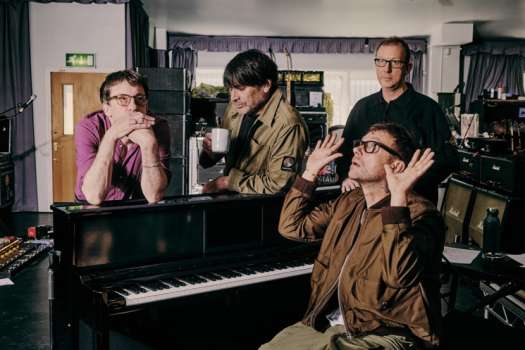A few weeks ago, members of the international music community banded together with Live 8 to effect tangible change in an African continent devastated by decades of extreme poverty, violence, and international exploitation. As one of only a handful of African representatives asked to participate in the Barrie concert or for that matter, as part of any of the international concerts Somali-born musician K'naan occupied an interesting position on a bill consisting, for the most part, of big-name Canadian rockers and celebrity guest hosts. The Toronto-based MC was one of the few performers that could supply a true face, personality, and historical and cultural context to the global apathy in which Africa is allowed to simply disintegrate. It's an idea that is played out in the many emotionally inspired tales that comprise K'naan's recently released full-length debut, Dusty Foot Philosopher, an album that finds him not only fighting to explain where he's from, but also where he's at.
K'naan's story is pockmarked by incidents of struggle and survival. He was forced to flee a war-ravaged Somalia in the early '90s as a refugee on the last commercial flight ever to do so; at 13 years of age he was old enough to remember the way things had been before they became intolerable. His memories form the poetic opening to "My Old Home," a track that explains the beautifully communal aspects of Somali society, where people made due and poverty was a foreign concept. That was, of course, before the guns rained down and washed away any semblance of normalcy.
The conflict between these two representations of one of the world's oldest societies comes to a head rather frequently in K'naan's music. The immediacy of violence is represented in songs like "What's Hardcore?," which describes Somali streets as being "harder than Harlem and Compton intertwined." While the track appears to put hard rock, American ghetto boasts in perspective against the rocket launcher-carrying thugs of Mogadishu, K'naan wants to make clear this is not glorification, but rather a part of the story that cannot be sugar-coated.
"What's important is that I don't use [violence] in that manner because I value the dignity of my struggle," he explains. "I'm not about trying to boast because I've had a tough and violent background. I'm a survivor and that's it. It's in my nature and I'm fortunate to be here, and I'm making music about my people and about my struggle."
In this respect, K'naan holds fast to his belief that "aggressive obsession with pain never gains," instead drawing upon the aural traditions that have sustained knowledge in his culture for centuries, and enacting these same principles to elicit change in the world's thinking, one city at a time. His songs blend clever, insightful and uplifting lyricism with a mixture of conventional hip-hop and traditional African rhythms to convey touching stories of personal survival in a place where life is often not valued. His videos for both "Soobax" and "Strugglin'" sear dignified images of his people into the screen, while in his live shows he assumes the role of their spokesperson as naturally as though he was born to serve this very function, seemingly channelling the energy of his nation.
It's all part of a life and a reality that may seem a lot to take in for our nation, still at a stage of relative adolescence, and which has known very little historical hardship or very little history, for that matter. But this is not something K'naan seems all too worried about. "I don't know that [Canadian audiences] relate to the story, but I think that they feel the story," he assures. "People may not be able to say, Man, I understand where you're coming from.' But they may say, I feel your spirit,' and that's important. I think that's what I look for."
K'naan's story is pockmarked by incidents of struggle and survival. He was forced to flee a war-ravaged Somalia in the early '90s as a refugee on the last commercial flight ever to do so; at 13 years of age he was old enough to remember the way things had been before they became intolerable. His memories form the poetic opening to "My Old Home," a track that explains the beautifully communal aspects of Somali society, where people made due and poverty was a foreign concept. That was, of course, before the guns rained down and washed away any semblance of normalcy.
The conflict between these two representations of one of the world's oldest societies comes to a head rather frequently in K'naan's music. The immediacy of violence is represented in songs like "What's Hardcore?," which describes Somali streets as being "harder than Harlem and Compton intertwined." While the track appears to put hard rock, American ghetto boasts in perspective against the rocket launcher-carrying thugs of Mogadishu, K'naan wants to make clear this is not glorification, but rather a part of the story that cannot be sugar-coated.
"What's important is that I don't use [violence] in that manner because I value the dignity of my struggle," he explains. "I'm not about trying to boast because I've had a tough and violent background. I'm a survivor and that's it. It's in my nature and I'm fortunate to be here, and I'm making music about my people and about my struggle."
In this respect, K'naan holds fast to his belief that "aggressive obsession with pain never gains," instead drawing upon the aural traditions that have sustained knowledge in his culture for centuries, and enacting these same principles to elicit change in the world's thinking, one city at a time. His songs blend clever, insightful and uplifting lyricism with a mixture of conventional hip-hop and traditional African rhythms to convey touching stories of personal survival in a place where life is often not valued. His videos for both "Soobax" and "Strugglin'" sear dignified images of his people into the screen, while in his live shows he assumes the role of their spokesperson as naturally as though he was born to serve this very function, seemingly channelling the energy of his nation.
It's all part of a life and a reality that may seem a lot to take in for our nation, still at a stage of relative adolescence, and which has known very little historical hardship or very little history, for that matter. But this is not something K'naan seems all too worried about. "I don't know that [Canadian audiences] relate to the story, but I think that they feel the story," he assures. "People may not be able to say, Man, I understand where you're coming from.' But they may say, I feel your spirit,' and that's important. I think that's what I look for."




